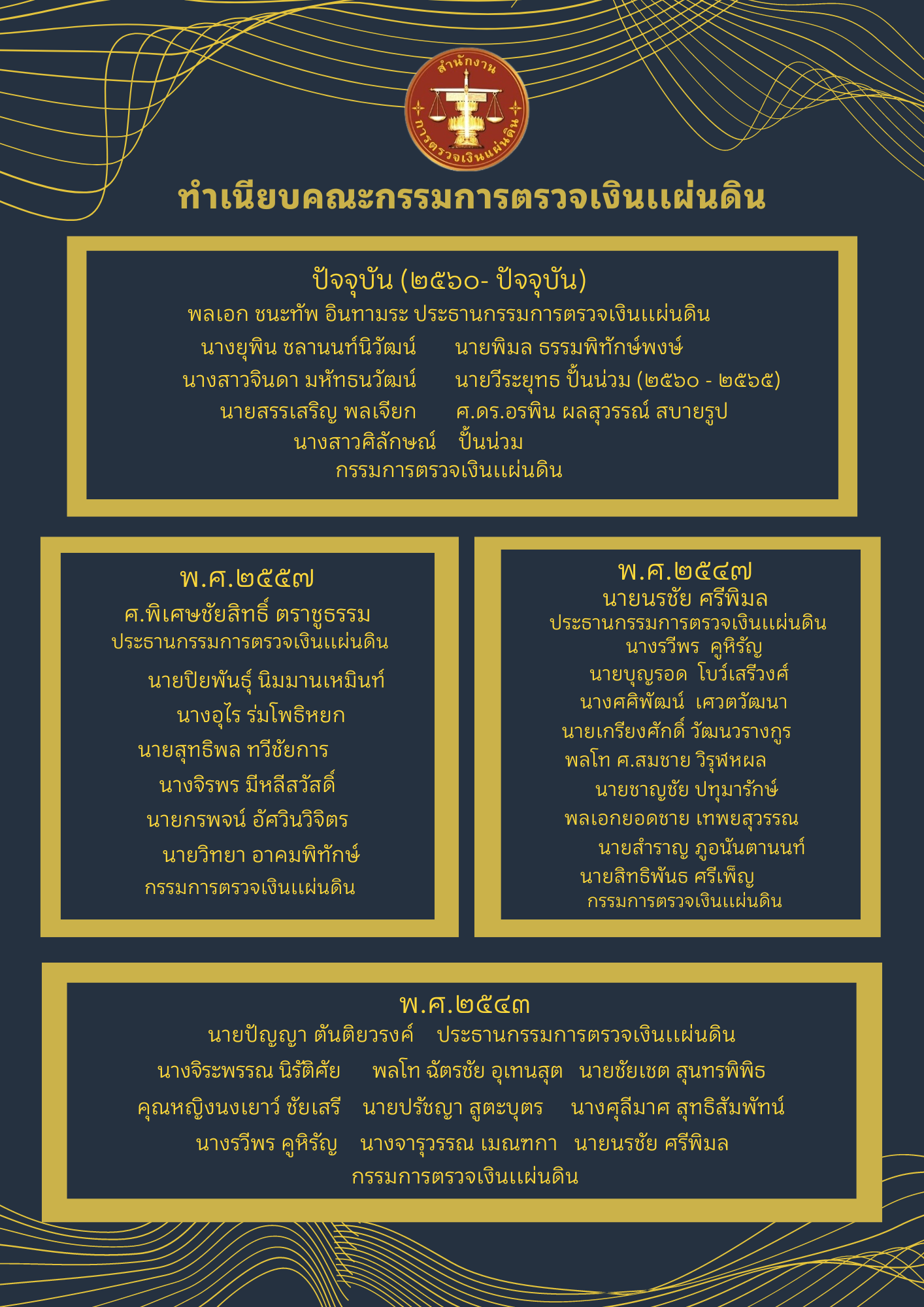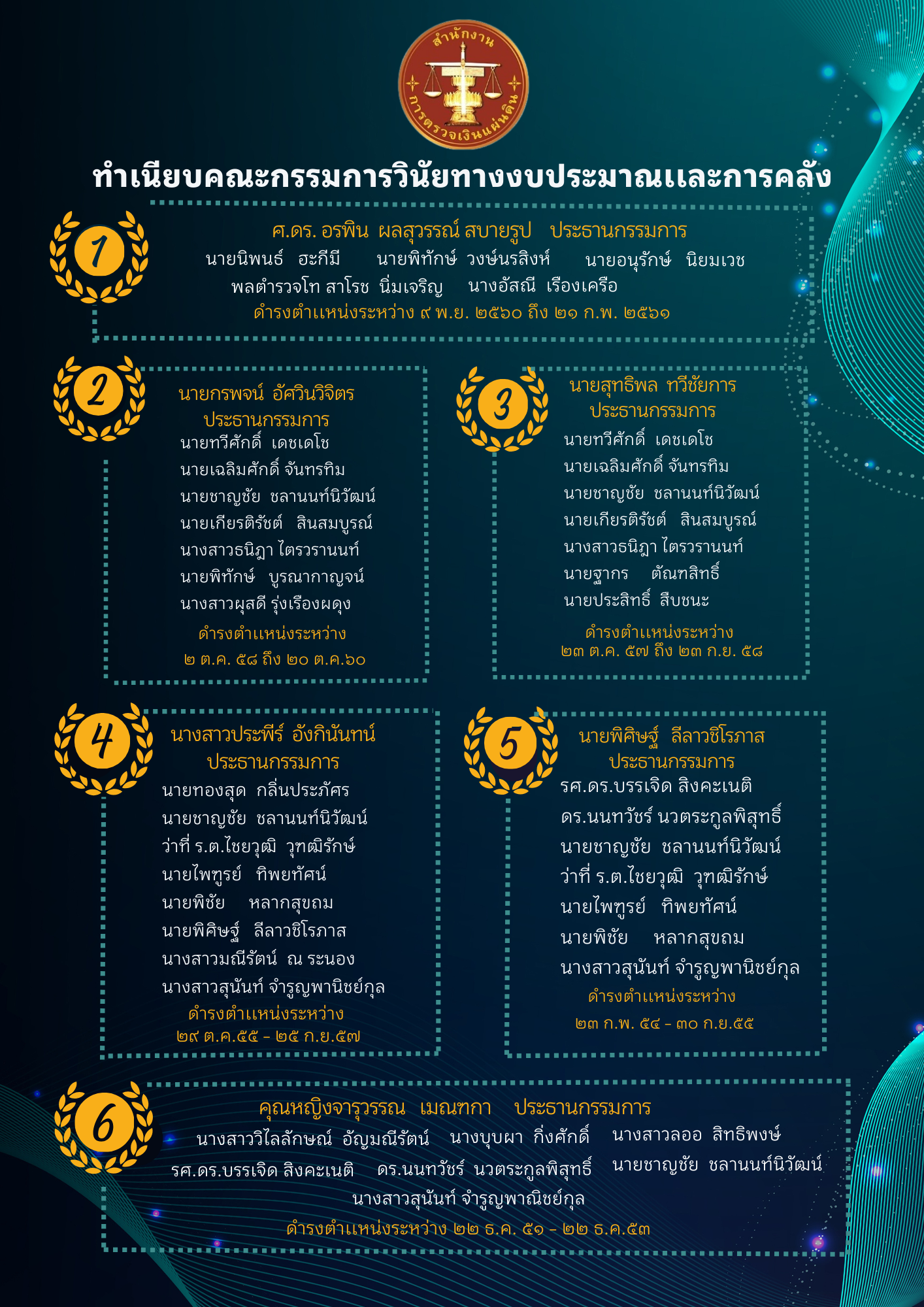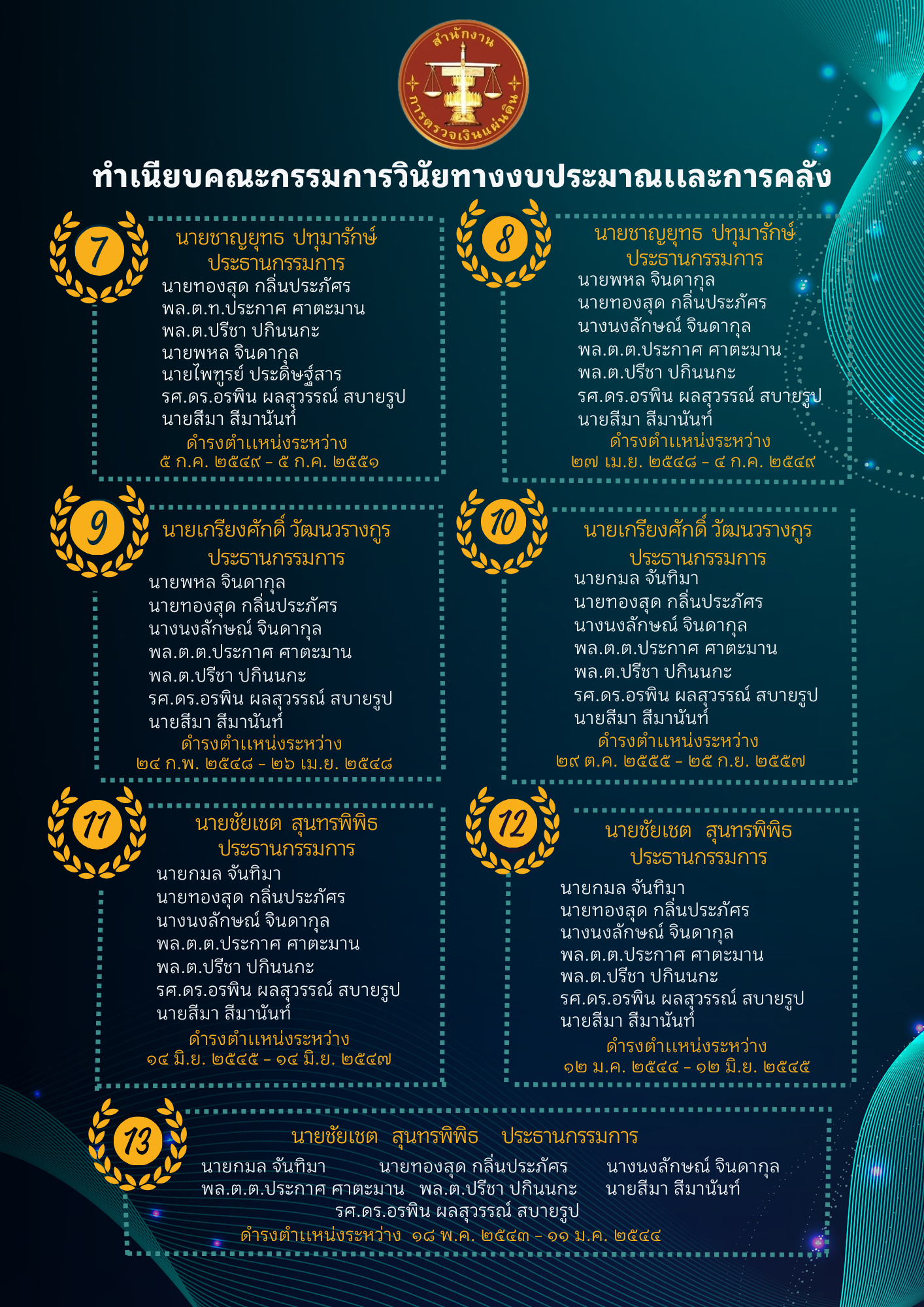The history of budgetary and fiscal discipline towards development into state financial and fiscal discipline.
Budgetary and financial discipline was first established in the Constitution of the Kingdom of Thailand B.E. 2540, with the key principle being the control and verification to ensure that officials or employees of the audited units comply with the financial control measures set by the State Audit Commission. This aims to ensure that the financial control and audit system operates effectively and maintains financial discipline. The accountability for budgetary and financial discipline is distinct from liability under other relevant laws, due to the lack of legal enforcement against officials who violate state financial control measures when misconduct related to budget management is discovered. In practice, the Office of the Auditor General could only forward the matter to the superior of the offender or the investigating officer for further action, without being involved in the consideration of penalties. Thus, the role of the Office of the Auditor General is merely to conduct audits without direct punitive authority, resulting in a lack of respect for the auditing process of state expenditures. The existing forms of liability, including disciplinary, civil, and criminal liabilities, are inappropriate and cannot be practically enforced. For instance, disciplinary penalties, such as reprimands, salary cuts, demotions, dismissals, and terminations, are often not imposed because the offenses typically benefit the offenders' own agencies. Consequently, disciplinary actions rarely occur, and civil penalties, in principle, are almost impossible to enforce. Due to the fact that most offenders often cannot find sufficient assets to compensate for the damage they have caused to the state, combined with the fact that criminal penalties are only punitive for the individual, the damage suffered by the state is not remedied or improved. Furthermore, the process of consideration in criminal cases has principles that differ from the process in administrative cases, where the plaintiff must provide evidence to the court to show that the defendant is guilty beyond a reasonable doubt. This makes it extremely difficult to bring offenders to face criminal penalties. Therefore, in order to enhance the effectiveness of the mechanism for monitoring and controlling state finances, the idea arose to establish a committee to adjudicate budgetary and financial disciplinary offenses, based on the model of budgetary and financial disciplinary courts in France. This committee is tasked with determining administrative fines for officials or employees of auditing units who commit offenses that fall under the elements of budgetary and financial disciplinary violations according to the law. Consequently, the principles of the budgetary and financial disciplinary system were enshrined in the draft constitution of 1997, and when the Constitution of the Kingdom of Thailand was promulgated in 1997, it marked the beginning of the budgetary and financial disciplinary system in Thailand.
The Constitution of the Kingdom of Thailand, B.E. 2540 (1997), Chapter 11 concerning the audit of public finances, Articles 312 and 333, established a new structure for the Office of the Auditor General as an independent organization, with an independent and neutral Board of Auditors and Auditor General. It also mandated the creation of laws to support the constitutional provisions regarding public finance audits. Subsequently, the Organic Act on Auditing Public Finances B.E. 2542 (1999) was enacted to define the powers and duties of the Board of Auditors and the Budget and Finance Discipline Committee, particularly in setting criteria and procedures for budgetary and financial discipline, imposing administrative penalties, and adjudicating disciplinary and budgetary violations as the highest authority. Therefore, to ensure that the public finance audit control system operates effectively and with discipline, under Section 19 of the Organic Act on Auditing Public Finances B.E. 2542, the Board of Auditors established measures regarding state financial control by issuing the Board of Auditors’ Regulations on Budgetary and Financial Discipline B.E. 2544 (2001), which stipulates the financial and fiscal management that must be adhered to according to existing laws, regulations, or other requirements that the audited entity must comply with. This is considered budgetary and financial discipline. If officials of the audited entity intentionally violate the measures regarding state financial control as specified in the regulations, it is deemed a violation of budgetary and financial discipline and they must face administrative penalties, with the Budget and Finance Discipline Committee having the authority to consider and impose initial administrative penalties. The Office of the Auditor General has the authority to consider and determine violations of budgetary and financial discipline as the highest organization.
According to the Organic Act on State Audit B.E. 2542 (1999), Section 23 stipulates that the decisions of the State Audit Commission are final. Therefore, they are considered administrative orders that affect the status of individuals' rights. Administrative consideration must have processes and procedures that genuinely guarantee fairness, adhering to the principles set forth by the law on administrative procedures. The system for adjudicating budgetary and financial disciplinary offenses is regarded as an administrative justice process. Thus, it is necessary to create a mechanism for adjudicating budgetary and financial disciplinary offenses that has a quasi-judicial nature, using an inquiry system to gather facts based on the principle of hearing all parties involved. This is similar to the administrative trial procedures of the Administrative Court under the Act on the Establishment of Administrative Courts and Administrative Court Procedures B.E. 2542 (1999). The regulations of the State Audit Commission on the procedures for adjudicating budgetary and financial disciplinary offenses B.E. 2544 (2001) have established a three-tiered system for adjudicating such offenses It is the responsibility of the official in charge of the case to compile facts and provide independent opinions to the Budget and Financial Discipline Committee. The Budget and Financial Discipline Committee is responsible for considering and imposing preliminary administrative penalties, while the State Audit Commission is tasked with adjudicating and determining administrative penalties against officials who commit violations of budgetary and financial discipline. This creates a system for examining and adjudicating violations of budgetary and financial discipline that is participatory, balanced, transparent, fair, and allows for the review of the reasonableness of the decisions in accordance with the administrative trial process under public law principles.
Subsequently, the Constitution of the Kingdom of Thailand, B.E. 2550, was enacted, which established significant provisions to encompass the national budget more extensively and renamed it “Financial Discipline and Budgeting.” Section 253 stipulates that the State Audit Commission has the authority to appoint an independent Financial and Budgetary Discipline Committee to adjudicate matters related to financial discipline and budgeting. It also designates disputes regarding the committee's decisions in such matters as cases under the jurisdiction of the Administrative Court. Therefore, the State Audit Commission does not have the authority as the ultimate adjudicating body in the process of financial discipline and budgeting. However, since there has been no amendment to the Organic Act on State Audit to align with the provisions of the Constitution of the Kingdom of Thailand, B.E. 2550, coupled with the transitional provisions in Section 302 stating that the Organic Act on State Audit B.E. 2542 shall remain in effect until a new version is enacted, both the Organic Act on State Audit B.E. 2542 and the regulations of the State Audit Commission on budgetary and financial discipline B.E. 2544, as well as the regulations on the procedures for adjudicating budgetary and financial discipline violations B.E. 2544, continue to remain in effect. Nonetheless, the provisions of Section 167 of the Constitution of the Kingdom of Thailand, B.E. 2550, serve as the source of the concept for enacting state financial legislation to establish a framework for financial discipline. This must be used as a framework for generating revenue, regulating expenditure according to the principles of maintaining stability, sustainably developing the economy, and ensuring social equity. The Ministry of Finance proposed this draft legislation to the Cabinet for approval of the principles, but it was not submitted to the Parliament, resulting in the fact that at that time, the state financial legislation was not yet in effect. Until now, with the promulgation of the Constitution of the Kingdom of Thailand, B.E. 2560, Chapter 5, Duties of the State, Section 62, Paragraph One, stipulates that the state must strictly maintain financial discipline to ensure that the state’s financial position is stable and sustainably secure according to the law on state financial discipline. Section 240 stipulates that the State Audit Commission has the duty and authority to impose administrative penalties in cases of violations of the law on state financial discipline, in accordance with the Organic Act on State Audit. This is due to the fact that in the past, the public financial management system of Thailand faced several issues, including:
(1) The issue of the public financial management system in Thailand is a centralized management system, which operates in a closed system, leading to problems that do not respond at the local level and resulting in a lack of public participation in financial and budgetary decision-making.
(2) The problem of the dispersion of financial laws in Thailand, which currently has many different statutes, such as the Treasury Act B.E. 2491, the Budget Procedure Act B.E. 2502, and the Public Debt Management Act B.E. 2548, results in a lack of unity in the enforcement of financial laws, leading to redundancy in financial legislation.
(3) Legal issues related to finance that do not take into account future financial obligations. That is, despite efforts to prepare a medium-term budget, in practice, annual expenditures are still being considered, which affects the government's future budget capacity.
(4) Issues of flexibility, agility in budget establishment, and excessive budget spending, whether it is setting expenditures for the central budget, contingency funds for emergencies or necessities, or using cash reserves and off-budget funds without established rules for detailed project planning and budget ceilings or budget utilization.
(5) The problem of not having penalties defined for agencies that violate the provisions of financial law.
The Fiscal Discipline Act of 2018 was enacted as a framework for maintaining fiscal discipline. Section 6 stipulates that the state must implement fiscal policies, budget preparation, revenue generation, expenditure, financial management, and debt incurrence effectively, transparently, and in a verifiable manner, in accordance with the principles of maintaining stability and sustainable economic development, as well as social equity. The state must strictly adhere to the fiscal discipline as prescribed in this Act and other relevant laws. Additionally, Section 80, paragraph two, states that in cases of violations of fiscal discipline as specified in this Act, administrative penalties shall be imposed in accordance with the law governing the audit of public funds.
The Constitution of the Kingdom of Thailand, B.E. 2560 (2017), Section 240, together with the Organic Act on the State Audit B.E. 2561 (2018), Section 27(5), stipulates that the State Audit Committee has the duty and authority to impose administrative penalties in cases of violations of laws concerning financial discipline of the state. In considering and adjudicating for administrative penalties, the State Audit Committee shall primarily rely on the audit report from the Auditor General but must also allow the accused to explain and present evidence for consideration. The notification of charges to the accused and the submission of explanations by the accused must follow the criteria and procedures set by the State Audit Committee. Therefore, the State Audit Committee issued regulations on the consideration and adjudication of violations of financial discipline of the state, B.E. 2562 (2019), which established the procedures for notifying charges, explaining and refuting charges, gathering facts and evidence, and adjudicating violations of financial discipline to impose administrative penalties. Administrative penalties include reprimands, public censure, and administrative fines. The party subjected to administrative penalties may appeal to the Supreme Administrative Court within 90 days from the date of receiving the order. In the consideration of the Supreme Administrative Court, the policies of state auditing and the standards related to state auditing must be taken into account.
In summary, "budgetary and financial discipline" according to the Constitution of the Kingdom of Thailand B.E. 2540 and the Constitution of the Kingdom of Thailand B.E. 2550 has the Office of the Auditor General serving as the supervising body and the highest adjudicating authority on matters of budgetary and financial discipline. There is a Budgetary and Financial Discipline Committee responsible for gathering facts and conducting preliminary considerations, with the Office of the Auditor General's regulations on the procedures for adjudicating budgetary and financial discipline violations B.E. 2544 outlining the process for examining and ruling on such violations. Additionally, the Office of the Auditor General's regulations on budgetary and financial discipline violations B.E. 2544 specify actions that, if violated, will incur penalties related to budgetary and financial discipline. The elements of the offense include that the perpetrator must be an official, have responsibilities, and intentionally commit wrongdoing as defined by the regulations. With the promulgation of the Constitution of the Kingdom of Thailand B.E. 2560, this was changed to "financial discipline" under the State Financial Discipline Act B.E. 2561 It is the main law regarding the financial discipline of the state that is clear, and in cases of violations of state financial discipline as specified in this Act, the "State Audit Commission" has the authority to impose administrative penalties solely. There is no "Budget and Financial Discipline Committee" to consider and impose preliminary administrative fines as in the past. The principle of proposing violations of state financial discipline and imposing administrative penalties shall be in accordance with the Organic Act on State Audit B.E. 2561, while the criteria for controlling state officials with responsibilities related to state finance shall be in accordance with the law on state financial discipline or the Act on State Financial Discipline B.E. 2561 itself.
[1] Banjerd Singkhaneti, "Project on the Study of the Enforcement of Audit Law," Complete Research Report, Office of the Auditor General, (August 2011), p. 90.
[2] Aropin Polsuwarn, Complete Research Report on the Research Project on Budgetary and Financial Discipline, (January 2006), pp. 73-74.
[3] Patthawarin Bunchu, Issues of Control and Supervision of Financial Discipline of the State under the Constitution of the Kingdom of Thailand B.E. 2560, Dissertation, Faculty of Law, Thammasat University, pp. 190-191.
[4] Academic Services Group, Academic Office, Secretariat of the House of Representatives, Document for Consideration of the National Reform Driving Council, Discussion and Suggestions on the Draft Constitution (State Finance and Budget) A.P. 8/2558, November 2015, pp. 3-4.
[5] Patthawarin Bunchu, op. cit., Footnote 3, p. 193.



Home